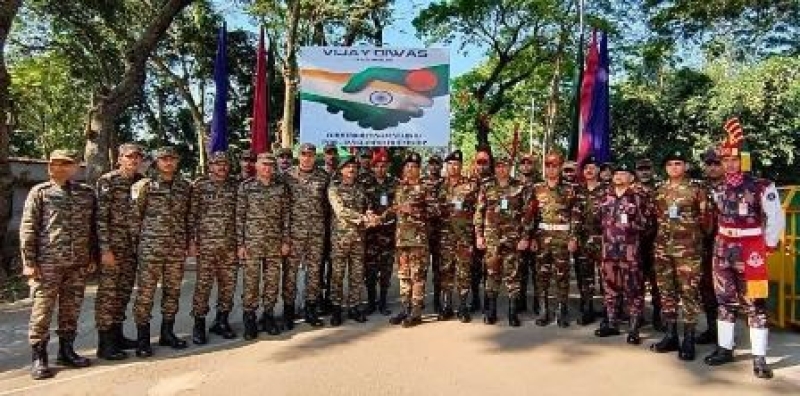- CA Yunus pays homage to Liberation War martyrs on Victory Day |
- Bangladesh capital market extends losing streak for second day |
- Bangladesh celebrates Victory Day Tuesday |
- 'Different govts presented history based on their own ideologies': JU VC |
It’s Bangladesh’s War of Independence, Not an India-Pak War

Members of armed forces of the two countries came together at the Agartala-Akhaura border on the occasion of the Victory Day on Monday (1)
One of the most poignant and significant aspects in the history of Bangladesh, the Liberation War of 1971 made the Bangladeshis face one of the bloodiest genocide in the 20th century for nine unbearable months at the hands of Pakistani military atrocities. What often gets lost in the international narratives is that this war was not an extension of India-Pakistan hostilities; it was essentially Bangladesh's war for independence.
People's Struggle for Liberation
The roots of the war come from the socio-political discrimination perpetrated against the Bangladeshi people of East Pakistan over years. Indeed, in 1970, during a national election in which citizens of the East wing overwhelming voted for the Awami League, thereby ensuring a right for Sheikh Mujibur Rahman to form the government, the West Pakistani establishment refused to hand power over to them.
On March 25, 1971, the Pakistan army launched Operation Searchlight, a brutal campaign to extinguish the legitimate demand of the Bangladeshi people for independence. It marked the beginning of a people's war—a war waged by the men, women, and youth of Bangladesh against an occupying force.
Millions of Bangladeshis took up arms, and millions supported this resistance that came to be broadly grouped under the Muktibahini-the freedom fighters literally carrying the war on their shoulders. Simultaneously, ordinary citizens faced massacres, rapes, and dislocation. It is estimated that three million people were killed, with over ten million refugees seeking asylum across the border in India.
India’s Role: Crucial but Secondary
India played a very important role in the support of the people of Bangladesh, mainly by providing shelter to millions and training a lot of Muktibahini fighters. But the direct military involvement of India came in December 1971, after the airstrikes by Pakistan upon Indian airbases. That was followed by the formation of the Joint Forces-a combination of India's military and Bangladesh's Muktibahini fighters. Together, they delivered the final blow to the Pakistani military, leading to the liberation of Dhaka on December 16, 1971.
One mustn't forget that the Indian intervention, though decisive, was a supportive effort in the war that the people of Bangladesh had fought for months. In general, the framing of the 1971 War as an "India-Pakistan war" completely sidesteps and marginalizes the sacrifice of millions of Bangladeshis into relative footnote status.
A History Shared, Not a Single Victory
Leaders like Indira Gandhi, the Indian Prime Minister, realized the fight for freedom in Bangladesh was of essence. Her government's military intervention was both a humanitarian gesture and one of strategy. She gave respect to the agency of Bangladeshi people and their right to sovereignty.
Narratives being pursued by some Indian leaders of late have come to distort this shared history. By painting the events of 1971 as no more than an India-Pakistan conflict, they would reduce Bangladesh to a peripheral observer in its own liberation. This not only belittles the sacrifice of Bangladesh but also misrepresents a historic moment in the partnership between the two.
Bangladesh's Legacy of Courage
Bangladesh Legacy of Honour The Liberation War of Bangladesh acts as a proof for the guts and durability of the people. For a reason, this is one's very own vernacular language and culture that has to be fought out for one's life against an adversary force. For no reason, the blood spilling and the heroes' sacrifices of Bangladeshi people should wear the look of political propagandas claiming it. The international community has to recognize the 1971 War as what it was-a War of Independence for Bangladesh, instead of being portrayed in terms of the continuation of India-Pakistan hostilities. Partnerships and alliances happened, and there were massive interventions with support from friendly States, yet the base for this liberation would be built on the people's fighting, bleeding for freedom. As we remember the date of December 16, Bangladeshi call Victory Day, let us pay respect to the truth of history: the people of Bangladesh secured their independence through their sacrifice of a kind hardly witnessed by the world and indomitable resolve. Their story remains one of inspiration for various freedom movements around the globe, and their story deservedly has to be told in all dignity and accuracy that it commands. The international community must recognize the 1971 war for what it was: Bangladesh’s War of Independence, not an extension of India-Pakistan hostilities.
Md. Musfiqur Rahman (Tuhin)
Student, United International University

